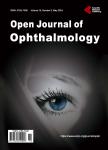Knowledge, Attitude, and Practices Regarding Diabetic Eye Disease among General Population in Medina City, Saudi Arabia
Knowledge, Attitude, and Practices Regarding Diabetic Eye Disease among General Population in Medina City, Saudi Arabia作者机构:Ophthalmology Department College of Medicine Taibah University Medina Saudi Arabia Ministry of Health Medina Saudi Arabia Internal Medicine Department National Guard Hospital Medina Saudi Arabia Primary Care and Community Health Medina Saudi Arabia Ophthalmology Department Ohud General Hospital Medina Saudi Arabia
出 版 物:《Open Journal of Ophthalmology》 (眼科学期刊(英文))
年 卷 期:2024年第14卷第1期
页 面:18-43页
学科分类:1002[医学-临床医学] 100201[医学-内科学(含:心血管病、血液病、呼吸系病、消化系病、内分泌与代谢病、肾病、风湿病、传染病)] 10[医学]
主 题:Knowledge Attitude Practices Diabetes Mellitus Eye Disease
摘 要:Background: Diabetic eye disease is known as a group of eye problems that diabetic patients may develop as a complication of diabetes and can lead to blindness. They may include Diabetic retinopathy (DR), Cataracts, and Glaucoma. Objectives: This study aims to assess the knowledge, attitude, and practices (KAP) around diabetic eye disease in the general population including patients with DM and non-diabetic people in Medina City, Saudi Arabia. Methods: This is a cross-sectional study involving 385 participants via a self-administered online Questionnaire started in January 2023 in Medina, Saudi Arabia. Results: In total, 339 participants with ages ranged from 18 to more than 60 years with a mean age of 26.8 ± 12.6 years old completed the questionnaire. The majority were females (74.6%), singles (67.8%), and had a university level of education (54.6%). Most of the study participants were found to have poor knowledge levels (67%) in comparison to 33% who had an overall good knowledge of diabetic eye diseases. Knowledge level was found to be higher among old-aged participants and those with a family history of DM (P = 0.001, P = 0.049) respectively. Regarding participants’ attitudes and practices, the study showed good attitudes toward eye care practice for diabetics with half of the participants (50%) reporting self-awareness as a reason that made them undergo the first eye screening. Conclusion: Participants in the present study have poor knowledge and awareness level of diabetic eye disease. Furthermore, positive attitudes and perceptions have been revealed by the participants toward the practice of providing eye care for diabetics. .



